Is Green Tea Good For Skin?
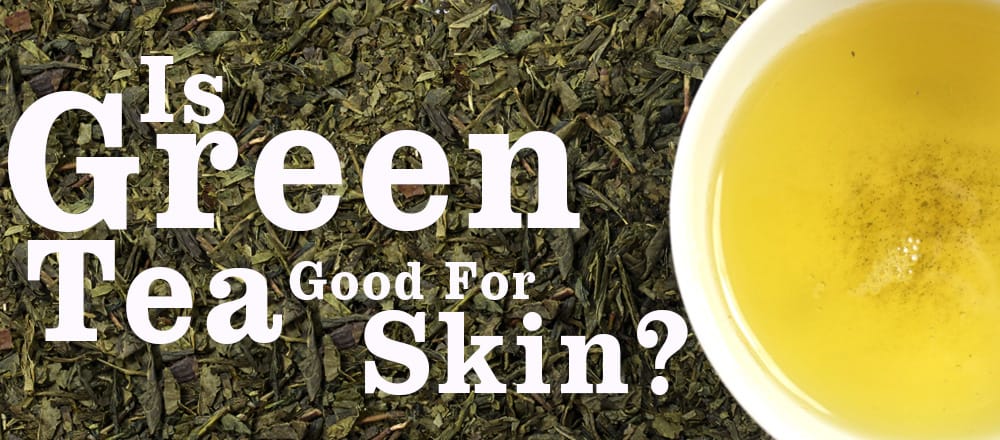
The health benefits of Green Tea cannot be overstated. Studies suggest that this wholesome and invigorating beverage can, among other qualities, improve cardiovascular health and promote weight loss. But is Green Tea good for skin, too? The short answer is yes. However, there is a lot more to this than meets the eye.
In this article, we will answer some of your frequently asked questions (FAQ) regarding “is Green Tea good for skin?”. The information below will consist of nothing but the facts with the evidence to back them. The Kent and Sussex Tea and Coffee Company, after all, steer clear of sensationalism and conjecture. Scientific research is behind each and every answer we provide.
Table of Contents
- What is Green Tea?
- What Does Green Tea do for Your Skin?
- How Can Green Tea Help Your Skin?
- Which Type of Green Tea is Best for Skin?
- Which Flavour of Green Tea is Best for Skin?
- Is Matcha Green Tea Good For Your Skin?
- Is Green Tea Good for Your Skin Acne?
- Is Green Tea Good for Oily Skin?
- Is Green Tea Good for Ageing Skin?
- Is Green Tea Good for Skin Allergies?
- Can Green Tea Tone Skin?
- How to Use Green Tea for Skin?
- How Many Cups of Green Tea a Day for Skin?
- When to Drink Green Tea for Skin?
- Does Green Tea Dehydrate Your Skin?
- Can Green Tea Irritate Skin?
- Conclusion
- Related Articles
What is Green Tea?
This type of Tea, like all ‘real’ Teas, comes from the Camellia sinensis plant. After harvesting, the leaves arrive at the factory for processing. Here, it is oxidised very little, meaning it maintains much of its natural chemical structure and taste. When brewed, Green Tea most commonly has a grassy flavour but may also have floral, vegetal, herbaceous or seaweed notes.
What Does Green Tea do for Your Skin?
Before we delve deep into the hows and whys of “is Green Tea good for skin?”, let’s look at it broadly. Green Tea can afford protection against a variety of skin conditions, including acne, oiliness, swelling, sun damage and even ageing. This is according to a 2000 report published in the Journal of the American Medical Association of Dermatology.
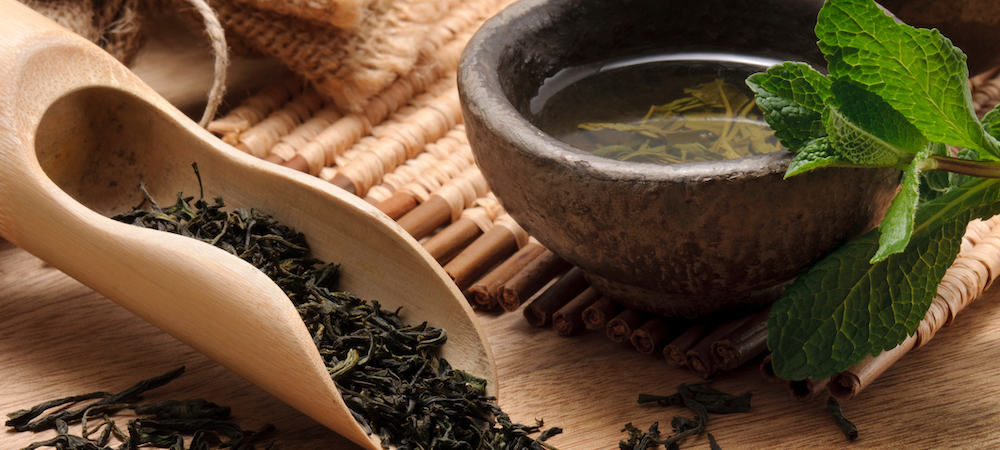
How Can Green Tea Help Your Skin?
How does Green Tea help your skin? There are, in fact, many ways. However, the primary reason is its wealth in antioxidants. In particular, Green Tea is rich in antioxidant compounds known as polyphenols – specifically polyphenolic catechins. Within this category is a subcategory, the most vital compound of that being Epigallocatechin gallate (EGCG).
So, what makes EGCG so special? More so than any other antioxidant in Green Tea, EGCG can combat free radicals in the body. These are unpaired (and unsafe!) electrons that are introduced through the natural, though harmful process of oxidation.
When left unchecked, free radicals latch onto staple electrons, thus destabilising them. This chain reaction causes untold damage, including increasing the risks of developing a multitude of chronic conditions.
By neutralising free radicals, EGCG slows down oxidative stress. Ultimately, this becomes a preventative measure against chronic conditions, including those related to skin. In other words, Green Tea is good for skin on a cellular level.
Which Type of Green Tea is Best for Skin?
Some types of Green Tea have more antioxidants than others (we’ll talk about this more later). However, for the most, it doesn’t particularly matter which kind you use. Each one can help with your skin, regardless of whether it’s, say, Yunnan Green Tea or Yamato Sencha Japanese Tea. Ultimately, it depends on personal tastes. Choose the one you like most!
Which Flavour of Green Tea is Best for Skin?
Again, there is little difference between Flavoured Green Tea and its unflavoured counterpart. Both types can benefit your skin. It’s up to you and your taste buds as to which one you choose. Depending on the ingredients, though, a flavoured infusion might have more calories. You can read more about this in our blog, “Calories in Tea and Nutritional Facts”.
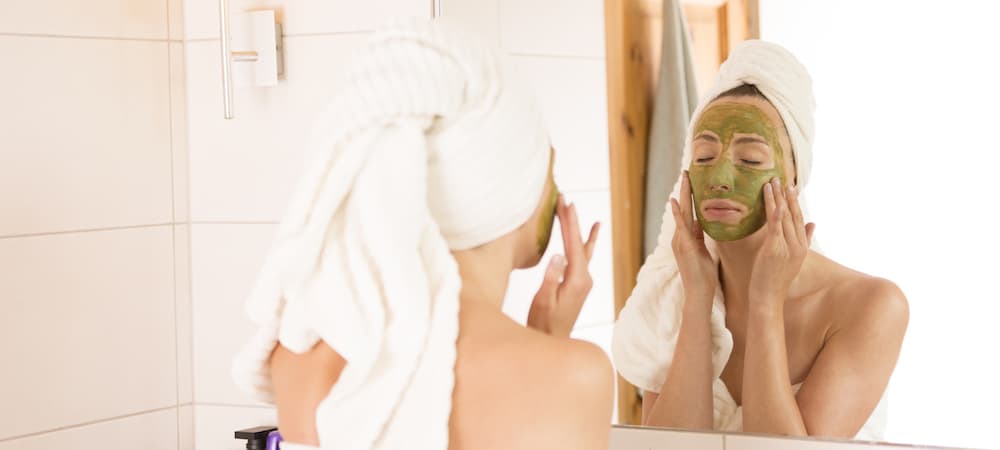
Is Matcha Green Tea Good For Your Skin?
Matcha is Tea in powdered form. The type of Tea can vary, although most associate it with Green Tea. The Camellia sinensis (Tea) plant used in its making is for two weeks shade-grown before harvesting. This allows the leaves to produce larger quantities of amino acids and chlorophyll, as well as a wealth of other antioxidants. In fact, because of the unique processing of Matcha, it reportedly contains 137 times more antioxidants than ‘standard’ Green Tea.
The more antioxidants, the better the skin benefits. It’s as simple as that! You can read more about this infusion in our blog, “Matcha Tea Benefits”. If you’d like to see a comparison, check out “Matcha Tea vs Green Tea”. Alternatively, have a look at our other articles, “How to Make Matcha Tea”and “Matcha Tea for Weight Loss”.
Is Green Tea Good for Your Skin Acne?
Yes, Green Tea is an excellent choice when it comes to treating skin acne. A 2016 study from Basel, Switzerland, can explain how. Researchers noted that the polyphenolic antioxidants in Green Tea, when applied topically, reduce sebum secretion. This is ultimately beneficial in the treatment of, in particular, acne vulgaris.
Is Green Tea Good for Oily Skin?
Similar to Green Tea for acne, by reducing sebum production, it can also help with oily skin. After all, sebum is, in essence, natural skin oil. The aforementioned Swiss study can be applied to this benefit, too.
Additionally, another study published in the Bosnian Journal of Medical Sciences provides yet more evidence. Ten male participants with oily skin used 3% Green Tea extract over eight weeks. By the end of the study, the results showed a 70% success rate in decreasing sebum production.
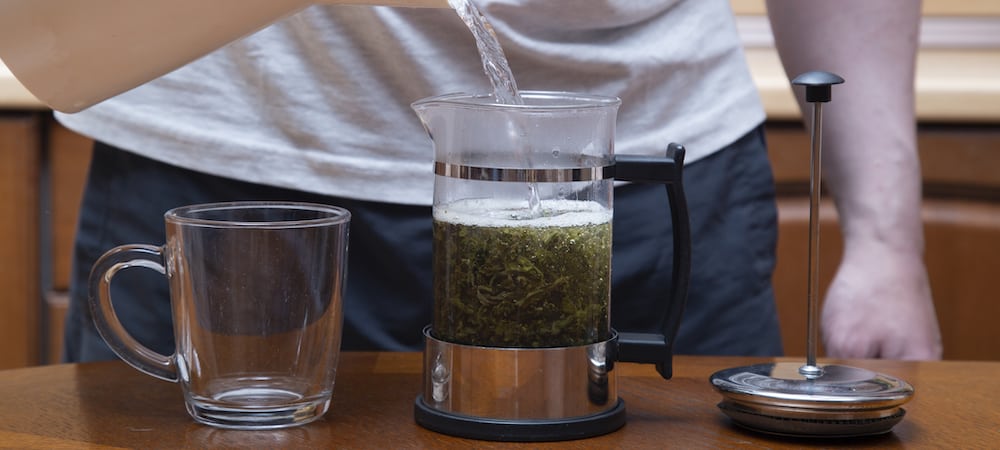
Is Green Tea Good for Ageing Skin?
Preliminary research suggests that there may, indeed, be correlations between Green Tea and reduced wrinkling. It’s essential, however, to note the word “preliminary”. Nevertheless, Dr Stephen Hsu, a cell biologist at the Medical College of Georgia, can explain Green Tea’s potential. He said:
“Cells that migrate toward the surface of the skin normally live about 28 days… by day 20, they basically sit on the upper layer of the skin getting ready to die… But EGCG reactivates them.”
Dr Hsu noted potential benefits for skin conditions as diverse as aphthous ulcers, psoriasis, rosacea and, best of all, wrinkles.
Is Green Tea Good for Skin Allergies?
Green Tea has anti-inflammatory properties that can help against skin swelling. However, for the most, there is little evidence to suggest that Green Tea can help with skin allergies at present. Until we know more, we do not endorse this Tea, or any Tea, for this purpose. Instead, we support ongoing research, as well as you consulting your doctor or another health professional.
Can Green Tea Tone Skin?
Does Green Tea darken skin? There is little evidence supporting this claim. What’s more, any website or magazine telling you otherwise is likely making things up. The amount of the pigment called melanin in the skin decides your complexion, not what you consume.
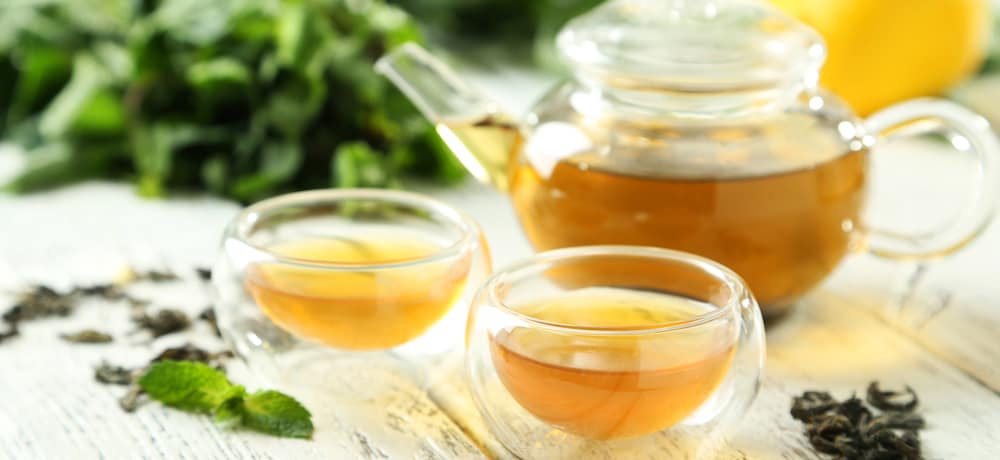
How to Use Green Tea for Skin?
There are two primary ways to use Green Tea for skin: ingesting it and applying it topically. It depends on what condition you’re trying to combat as to which method you should consider. With acne, for example, there is a popular topical method which is as follows:
1) Brew loose leaf Green Tea in warm (not boiling!) water.
2) Mix the leaves with honey or aloe vera gel.
3) Lightly spread the combination on your acne.
4) Keep the mask on for 10 to 15 minutes.
How Many Cups of Green Tea a Day for Skin?
Research is inconclusive concerning what dosage is most effective when drinking Green Tea for improved skin health. Most sources suggest 2-3 cups daily, although there is little evidence supporting this claim at present.
According to NHS Choices, if you’re pregnant, it’s important to drink no more than 5 cups. The reason for this is to limit caffeine intake to 200 mg daily. You can read more about this in our blog, “Green Tea Pregnancy”.
When to Drink Green Tea for Skin?
At what time in the day you choose to drink Green Tea doesn’t really matter concerning skin health. However, it’s worth noting that, on average, this beverage contains 30-35 mg of caffeine per 8 oz cup. This may cause side effects such as jitteriness and sleeplessness if consumed before bedtime. You can find out more information about this in our blog, “Green Tea Caffeine”.
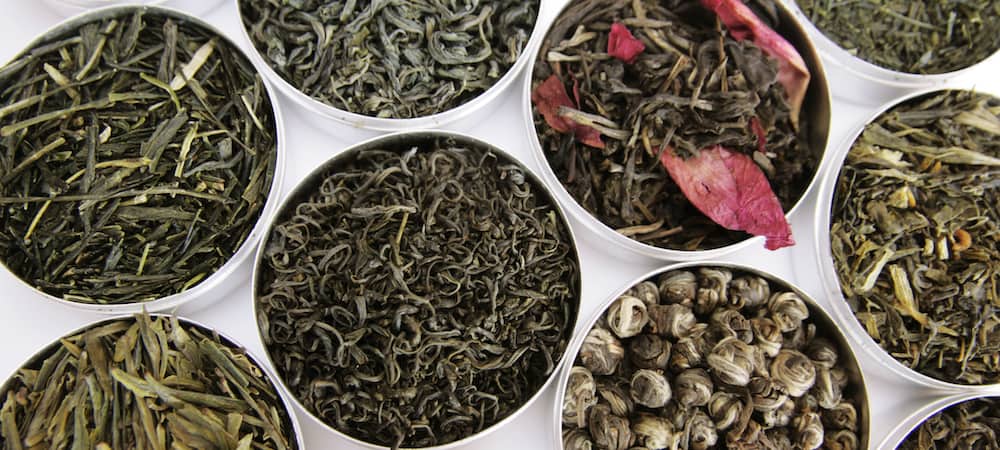
Does Green Tea Dehydrate Your Skin?
Green Tea is a diuretic, meaning it promotes the formation of urine, thus enabling the excretion of excess water. Although much of your cuppa is, in essence, water, it can still lead to frequent bathroom breaks. Losing too much water will inevitably lead to dehydration. However, whether this dehydrates the skin, in particular, isn’t certain. We await further research before confirming or denying this claim.
Can Green Tea Irritate Skin?
Yes, this is a proven, if uncommon side effect found in those who suffer from allergies. If you have an allergy to Green Tea, it’s difficult to determine what component, exactly, is to blame.
According to the Georgia Institute of Technology, though, it’s most commonly caffeine and tannins. (Read more about the latter component, in particular, in our blog, “Are Tea Tannins Bad For You?”). Even if your symptoms are mild, you should avoid drinking it if you experience itchy skin or other allergies.
Conclusion
Is Green Tea good for skin? You bet it is! While Matcha is a popular choice due to its wealth in antioxidants, all types can improve skin health. Evidence indicates that these remarkable beverages can help with acne and oily skin.
There is also research suggesting that they have anti-ageing properties! The results, however, differ depending on whether you drink it or apply it topically. Whatever you decide, be sure to buy from The Kent and Sussex Tea and Coffee Company.

 Loose Leaf Tea
Loose Leaf Tea Pyramids
Pyramids Tea Bags
Tea Bags Africa
Africa Assam
Assam Ceylon
Ceylon Chinese
Chinese Darjeeling
Darjeeling European
European Indian
Indian Japan
Japan Nepal
Nepal South East Asia
South East Asia Ayurveda Tea
Ayurveda Tea Black Tea
Black Tea Chai Tea
Chai Tea Flowering Tea
Flowering Tea Fruit Tisanes
Fruit Tisanes Green Tea
Green Tea Herbal Tea
Herbal Tea Matcha Tea
Matcha Tea Oolong Tea
Oolong Tea Organic Tea
Organic Tea Pu erh Tea
Pu erh Tea Rooibos Tea
Rooibos Tea White Tea
White Tea Asian Coffee
Asian Coffee Caribbean Coffee
Caribbean Coffee Central American Coffee
Central American Coffee South American Coffee
South American Coffee Coffee Blends
Coffee Blends Decaffeinated Coffee
Decaffeinated Coffee Espresso Coffee
Espresso Coffee Ethically Sourced Coffee
Ethically Sourced Coffee Flavoured Coffee
Flavoured Coffee Organic Coffee
Organic Coffee Single Origin Coffee
Single Origin Coffee Chocolate 1
Chocolate 1 Chocolate 2
Chocolate 2 Chocolate 3
Chocolate 3 Chocolate 4
Chocolate 4 Chocolate 5
Chocolate 5 Chocolate 6
Chocolate 6 Chocolate 7
Chocolate 7 Chocolate 8
Chocolate 8 Chocolate 9
Chocolate 9 Loose Tea Filters
Loose Tea Filters Tea Accessories
Tea Accessories Tea Bricks
Tea Bricks Tea Caddies
Tea Caddies Tea Caddy Spoons
Tea Caddy Spoons Tea Gift Ideas
Tea Gift Ideas Tea Infusers
Tea Infusers Tea Strainers
Tea Strainers